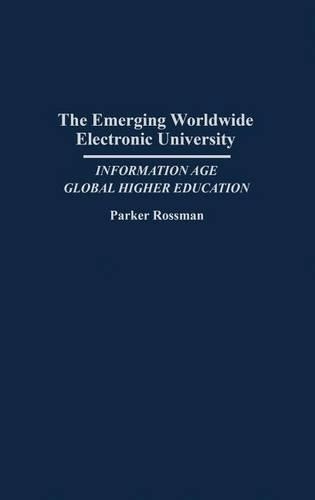
The Emerging Worldwide Electronic University: Information Age Global Higher Education
(Hardback)
Available Formats
Publishing Details
The Emerging Worldwide Electronic University: Information Age Global Higher Education
By (Author) Parker Rossman
Bloomsbury Publishing PLC
Praeger Publishers Inc
22nd July 1992
United States
Classifications
Tertiary Education
Non Fiction
Teaching skills and techniques
378.17078
Physical Properties
Hardback
184
Description
Higher education is changing dramatically as a result of global telecommunications. This book surveys and synthesizes the material currently available on this important topic. Much of the volume provides detailed and fascinating information on experiments, organizations, and ideas related to computer networks and higher education. Other sections examine the electronic organization of knowledge, electronic textbooks, and the many ways in which students may use computer connections to enhance their educational experience. At the heart of the study is the notion of a worldwide electronic university in which students, faculty and research libraries will be connected electronically across continents. The author begins by describing the early signs and origins of the emerging worldwide electronic university, such as the growth of courses made available through computer networks and television. He then considers some of the administrative issues involved and the responses of some corporations and organizations to those issues. The next few chapters describe and assess the value of educational exchange and the technology that makes that exchange possible. Other chapters discuss the linking of research libraries, the facilitation of international research, and emerging instructional issues. The result is an important guide to a topic of growing interest to educators and students alike.
Reviews
Parker Rossman offers an interesting, useful, and, inspiring review of current projects and future possibilities for a Worldwide Electronic University. His book comes at an opportune time when university-based computer networks are experiencing significant increases in daily use.-Harvard Educational Review
Parker Rossman's book is a delightful and provocative summary. He includes a substantial bibliography for further reading.-History Microcomputer Review
Particularly relevant to libraries is this upbeat and sophisticated 184-page treatise.-American Libraries
This in-depth, high-tech narrative covers everything from the administrative structure needed for global education to the connection of the world's research libraries, electronic textbooks, a worldwide electronic university press, the global classroom and instructor, and international research teamwork. Current technologies and their applications are described and forthcoming developments predicted. Particularly relevant to libraries, . . . upbeat and sophisticated.-American Libraries
While looking at some significant trends in the areas of distance education and electronic information exchange, Rossman presents an enthusiastic vision of the emerging, space age university of the future. Supercomputers, networks, and satellite links increase capability to communicate and collaborate internationally, as well as to organize and access greater amounts of knowledge. Knowledge is both the currency and the by-product of these interchanges, and microelectronic technology has given us the tools to capture and share the large amounts being generated. The book should interest a wide variety of readers. Rossman looks at this new online age from the perspectives of instructor, student, the community, and traces the impact on institutions at several levels--the administration, the library, and the classroom. The work is enlivened by his use of actual examples of the technology at work. He speaks of doctors sharing information through central data bases and gives examples of the use of distance education in diverse settings, such as the Pacific and Latin America and across the British Commonwealth. Recommended for graduate students; faculty; practitioners; and librarians.-Choice
"Parker Rossman offers an interesting, useful, and, inspiring review of current projects and future possibilities for a Worldwide Electronic University. His book comes at an opportune time when university-based computer networks are experiencing significant increases in daily use."-Harvard Educational Review
"Parker Rossman's book is a delightful and provocative summary. He includes a substantial bibliography for further reading."-History Microcomputer Review
"Particularly relevant to libraries is this upbeat and sophisticated 184-page treatise."-American Libraries
"This in-depth, high-tech narrative covers everything from the administrative structure needed for global education to the connection of the world's research libraries, electronic textbooks, a worldwide electronic university press, the global classroom and instructor, and international research teamwork. Current technologies and their applications are described and forthcoming developments predicted. Particularly relevant to libraries, . . . upbeat and sophisticated."-American Libraries
"While looking at some significant trends in the areas of distance education and electronic information exchange, Rossman presents an enthusiastic vision of the emerging, space age university of the future. Supercomputers, networks, and satellite links increase capability to communicate and collaborate internationally, as well as to organize and access greater amounts of knowledge. Knowledge is both the currency and the by-product of these interchanges, and microelectronic technology has given us the tools to capture and share the large amounts being generated. The book should interest a wide variety of readers. Rossman looks at this new online age from the perspectives of instructor, student, the community, and traces the impact on institutions at several levels--the administration, the library, and the classroom. The work is enlivened by his use of actual examples of the technology at work. He speaks of doctors sharing information through central data bases and gives examples of the use of distance education in diverse settings, such as the Pacific and Latin America and across the British Commonwealth. Recommended for graduate students; faculty; practitioners; and librarians."-Choice
Author Bio
PARKER ROSSMAN is Vice-President of the Global Systems Analysis and Simulation Project (GLOSAS/USA) and Chair of the GLOSAS/Global University Long Range Planning Committee. The former Dean of the Ecumenical Education Center at Yale University, he has published several books and more than a hundred articles on computers and education.
